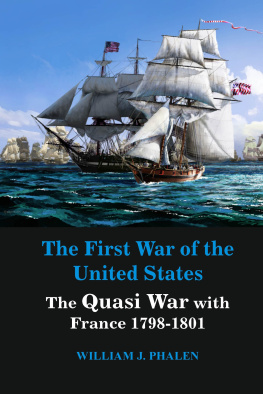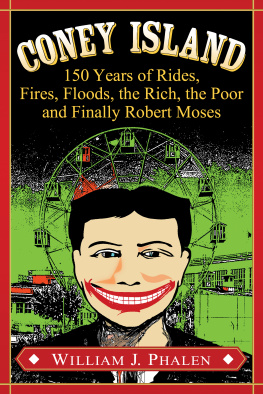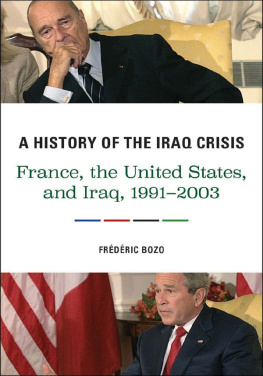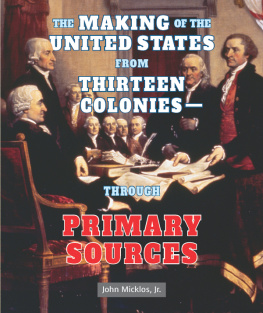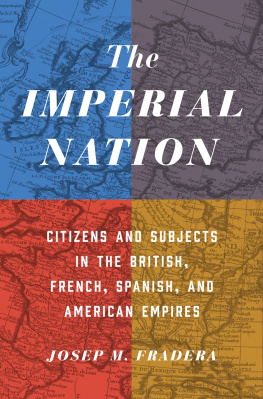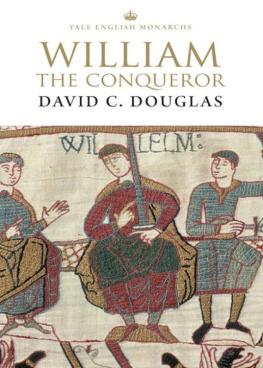The First War of the United
States:
The Quasi War with France
1798-1801
The First War of the United
States:
The Quasi War with France
1798-1801
by
William J. Phalen

Vij Books India Pvt Ltd
New Delhi (India)
Published by
Vij Books India Pvt Ltd
(Publishers, Distributors & Importers)
2/19, Ansari Road
Delhi 110 002
Phones: 91-11-43596460, 91-11-47340674
e-mail:
web : www.vijbooks.com
Copyright 2018, Author
ISBN: 978-81-93759-16-5 (Paperback)
ISBN: 978-81-93759-17-2 (ebook)
All rights reserved.
No part of this book may be reproduced, stored in a retrieval system, transmitted
or utilized in any form or by any means, electronic, mechanical, photocopying,
recording or otherwise, without the prior permission of the copyright owner.
Application for such permission should be addressed to the publisher.
The views expressed in this book are of the author in his personal capacity and do
not represent the views of the institution he belong to.
To one and all, Maureen, Hilary, John,
Cassia, Callan, Jane, Brendan, Megan, Gia,
Maggie, and the other creatures that have
fur and fins.

A s the title indicates, this book is the story of a little known conflict between the United States and France soon after the founding of the American nation. The conflict is important because of the involvement of the United States not only in another war almost immediately after its revolution, but also the new nations attempt to find its way in dealing with international situations.
During the period of the French Revolution and the European wars, neutral nations, especially the United States, because they had the largest share of the Atlantic carrying trade, should have gained enormous profits. Unfortunately, this was not the case, in fact the reverse was true, neutral commerce suffered severely at the hands of the different belligerents.
In a message to Congress on December 6, 1793, President Washington called attention to these facts, asking those who had suffered losses to furnish proof that measures might be taken to redress their grievances. Early in 1894, a group of Philadelphia merchants submitted a list of their losses with proof adding, It has become a practice for many of the privateers of the belligerent powers to send into port all American vessels they meet with, bound from any of the French ports in the West Indies to the United States;... and though many of these vessels have been afterwards liberated, yet the loss by plunder, detention, and expense is so great as to render it ruinous to the American owner.
The Quasi War was a direct outgrowth of the French Revolutionary Wars. In 1778, during the American Revolution, the United States and France signed treaties of alliance and commerce. In 1792, the French Revolution precipitated a general European war, and the following year Great Britain joined Frances continental enemies. Although still allied to France, was determined to avoid being drawn into this conflict.
The French had no objection to American non-intervention as long as the young republic clearly tilted its foreign policy towards France. Instead President George Washington in 1793 issued the Neutrality Proclamation, which warned Americans to adopt and pursue a conduct friendly and impartial toward belligerent Powers.
In 1794, the United States went further by signing the Jay treaty with Great Britain which, while not the American intention, caused two problems for the French. First, the they were convinced that the treaty was a betrayal of the Franco-American alliance and secondly, the trade that the American nation had with France, now basically went to England, tripling American exports to that country by 1801.
Because of these developments, In 1796, France attacked American commerce, attempting to force the United States to repudiate the Jay treaty. The United States, protected by the Atlantic Ocean and the British navy, rebuilt its own navy, and defended it self, leading to what became known as the Quasi War, an undeclared conflict fought entirely at sea, that neither nation wanted.
Gardner W. Allen, Our Naval War with France (Boston, Houghton Mifflin, 1909), p. 28-29
Proclamation of George Washington, April 22, 1793

W ith the end of the American Revolution, the United States began to profit from its trade with European nations, begun when it was a colony of Great Britain. By 1893 however this trade was interrupted by a continuation of the long standing enmity between England and France.
In 1778, the Treaty that the United States signed with France obligated each of the two nations to support one another if either went to war with England. When war came however, the United States fearing that it was too weak to wage war against England did not support the French. President Washington issued a proclamation in 1793 which spelled out the attitude of the United States towards the warring countries declaring that the United States will pursue a conduct friendly and impartial toward the belligerent powers.Further, to the dismay of the French in 1795, the United States and Great Britain signed what became known as Jays Treaty. Many of the terms of the treaty had to do with finally settling issues remaining since the Treaty of Paris which ended the American Revolutionary War, however the French believed that this agreement joined the United States to Great Britain, an agreement that would be against French interests. In vain we have hoped for some time that gratitude, or at least self-interest, would make of that federal republic a loyal ally of France. Now Washington [President] has concluded with our most implacable enemies a treaty wholly inimical to our interests.
Given this situation, the French began looking upon the United States as, if not an enemy, then as an offending neutral, which allowed commanders of French war vessels power to take cargoes on American ships, impress American seamen, and seize American ships as prizes.
How had this situation come about? When the first news of an armed revolt of the British colonies in America reached France, its potential impact was immediately assessed by the French government. At this time, England was not only a traditional opponent of France, but also, a growing economic competitor. Against France, the British were able to make up for her smaller population by almost permanent coalitions with other European powers and through an aggressive colonial expansion resting on a strong navy. The French King, Louis XVI and his secretary for Foreign Affairs, Comte de Vegennes made the decision to intervene in America when they received a report from their secret envoy, chevalier de Beaumarchais, who had been dispatched to Philadelphia in the fall of 1775. This report stating that The patriots have decided to proclaim their independence and fight fiercely for it, was received in Paris the following February.
On May 2, 1776, Louis XVI and Vergennes ordered Beaumarchais to create a company known as RoderiqueHortalez to which Vergennes wrote:
.We will give you a secret one million [Livres]. We will endeavor to persuade the court of Spain to give you another. With these two millions you shall find a great commercial establishment, and, at your own risk and peril, you shall furnish to American arms and everything else necessary to sustain war. Our arsenals will deliver to you arms and munitions, but you will pay for it.

